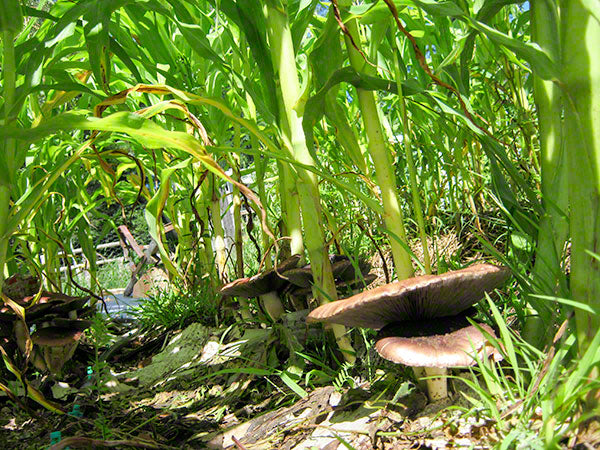Mushrooms can be grown on logs on a balcony, in a grow bag in a spare bedroom, or even directly in your garden. You can mix two tablespoons of laundry soap with 7 liters of water.

11 Handy Garden Carts For Hauling Gardening Tool Ideas
The green spored parasol, also called green lepiota or false parasol, is very common in garden beds and lawns during wet periods throughout spring, summer and autumn.

Common mushrooms in garden beds. If you have mold and fungus allergies, you may be particularly sensitive to the spores, so i would take ordinary precautions and/or allergy medications. Also, spores can get in your raised beds through airborne movement or from your clothing. Because of that, it’s best to remove any mushrooms you or your kid discovers in the backyard, particularly should your child is curious or tends to place things in their lips.
Mushrooms in your garden can create such a symbiotic relationship that is good for your plants. You may have seen some mushrooms popping up in your garden beds. As you may know, mushrooms are fungi, and the mushroom species list is a huge one.
Why do i have mushrooms growing in my raised garden bed? One of the most common mushrooms found growing in houseplants is the leucocoprinus birnbaumii. The spores that are the cause of mushrooms growing in houseplant soil is normally introduced by contaminated soilless mix.
About 100 common urban mushroom species can cause a response that is negatively ingested, but it’s challenging to know whether a mushroom is safe or poisonous. The spores that are the cause of mushrooms growing in houseplant soil is normally introduced by contaminated soilless mix. The mushrooms are the fruit of that fungus.
Usually, you see them most in beds that are mulched with bark or shredded wood; They can only survive in moist and humid conditions. Overwatering is also a very common reason why mushrooms are growing in raised beds.
Another way is by growing mushrooms in the garden. Common in mulch beds etc. By and large, you are good.
The texas plant disease diagnostic lab gets a lot of questions with regards to these sightings, everything from “is it dangerous?”, “ is it poisonous?”, “will it kill my plants?”, to “how. Mushrooms are shade tolerant, so you can add them under fruit trees or even. Spores could get into the bed with a contaminated commercial potting soil.
The most common treatment option is adding a general purpose fungicide. Essentially a recycled wood product. If it seems that no matter what you do your mulch bed is destined to house mushrooms, you can embrace them.
If the plants in your mulch bed enjoy a more neutral soil, you could add lime to your existing soil since mushrooms prefer more acidity. You can use detergents to kill the annoying mushrooms in your garden. Drill holes into the soil and fill them with the soap solution.
The fungi that produce mushrooms are indeed decomposing the organic matter in the soil, but they need moist conditions to thrive. Mushrooms in a garden bed: Because they love decomposing organics, they will actually help get rid of those.
As you said, never try to eat any of the unidentified mushrooms, but i agree that the plants and produce growing in the garden bed are safe to eat after washing them. While mushrooms may look like the garden is dirty, it is the other way around. In some situations mushrooms can be a sign that the soil is staying too wet.
You can grow some species of mushrooms like the king stropharia, oyster, or elm mushroom outdoors in a mushroom bed. Mushrooms are simply the fruiting body of a fungus that is helping to break down that nice mulch. However, wild mushrooms are poisonous thus should be done away with altogether.
More than 38,000 types of fungi are known as mushrooms, and they. Beautiful works of nature, mushrooms are hugely beneficial to a garden. Growing mushrooms outdoors in garden beds is low maintenance, produces quality food and provides a unique and beautiful addition to your yard.
One of the most common mushrooms found growing in houseplants is the leucocoprinus birnbaumii. The only thing with these fungi is that they might be unsightly in your garden, so you might want to get rid of them. Mushrooms are not harmful, and they will not harm your garden.
Then, are mushrooms good for a garden? And with some species, you can enjoy an even more beautiful. Many different species can be grown outdoors, but i am going to highlight one of our favorites:
King oyster mushrooms can be vastly different depending on growing conditions. All you need is wood chips, a bag of spawn, and a place to grow where you can keep it consistently moist. If you want to have a cleaner mulch garden, mushrooms may be helpful.

what weed is it? putting names to pesky plants A Way To

Companion Planting with the Garden Giant — Fungi Perfecti

Fireblight canker and twig dieback on crabapple (Malus

Yellow Stagshorn Calocera viscosa Yellow, Stuffed

Foraging Chanterelle Mushrooms Stuffed mushrooms








